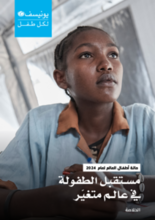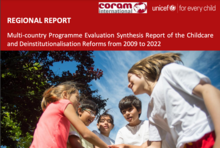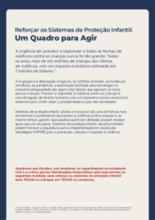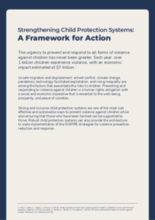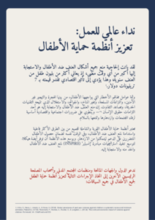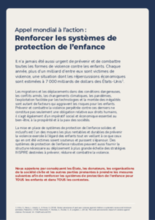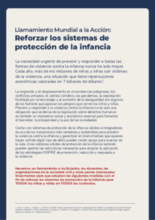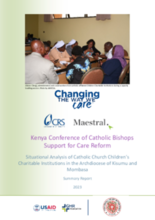Displaying 81 - 90 of 1028
يتناول هذا التقرير ثلاث قوى عالمية قوية وطويلة الأمد (أو اتجاهات كبرى) ستترك أثراً عميقاً على حياة الأطفال من الآن حتى عام 2050، وهي: التحولات الديموغرافية، وأزمات المناخ والبيئة، والتقانات الرائدة. وبفهم هذه الاتجاهات وتداعياتها على الأطفال، يمكننا أن ندرك بشكل أفضل التحديات والفرص التي تنتظرنا.
This report presents the main findings, conclusions, and recommendations of an evaluation of the child care and deinstitutionalisation reforms in seven countries in the Europe and Central Asia Region (Bulgaria, Georgia, Moldova, Montenegro, Northern Macedonia, Serbia and Tajikistan). The report offers valuable insights into the effectiveness of child protection systems and the transition from institutional care to family- and community-based alternatives. It highlights key achievements, lessons learned, and best practices, while also addressing the areas where further improvements are needed to ensure that every child can grow up in a nurturing, safe, and supportive environment.
This is a summary of an evaluation of the child care and deinstitutionalisation reforms in seven countries (Bulgaria, Georgia, Moldova, Montenegro, North Macedonia, Serbia and Tajikistan) for the period of 2009-2022.
A urgência em prevenir e responder a todas as formas de violência contra as crianças nunca foi tão grande.
The Child Protection System Strengthening Framework for Action was launched at the first Ministerial Conference on Ending Violence Against Children on 8 November 2024. This framework aims to strengthen child protection systems globally by promoting a cohesive approach to preventing and responding to violence against children in all contexts.
وثمة عوامل تفاقِم الأخطار التي يواجهها الأطفال، من بينها الهجرة والتهجير غير الآمنين، والنزاعات المسلحة، وتغير المناخ، والجوائح، والاستغلال الذي تتيحه التقنياتُ منع العنف ضد الأطفال والاستجابة إليه هو أحد الحديثة، وتصاعد التفاوت.
Il n’a jamais été aussi urgent de prévenir et de combattre toutes les formes de violence contre les enfants.
La necesidad urgente de prevenir y responder a todas las formas de violencia contra la infancia nunca ha sido mayor.
At the occasion of the 2024 UN Summit of the Future, Hope and Homes for Children organised the first in a series of policy dialogues on 16 September 2024 highlighting the important links between the Sustainable Development Goals and global child care reform.
This study aimed to gather data on Catholic Church Children’s Charitable Institutions (CCI) operations in Kenya, the children they serve, and the challenges they face, to inform future care reform strategies.

